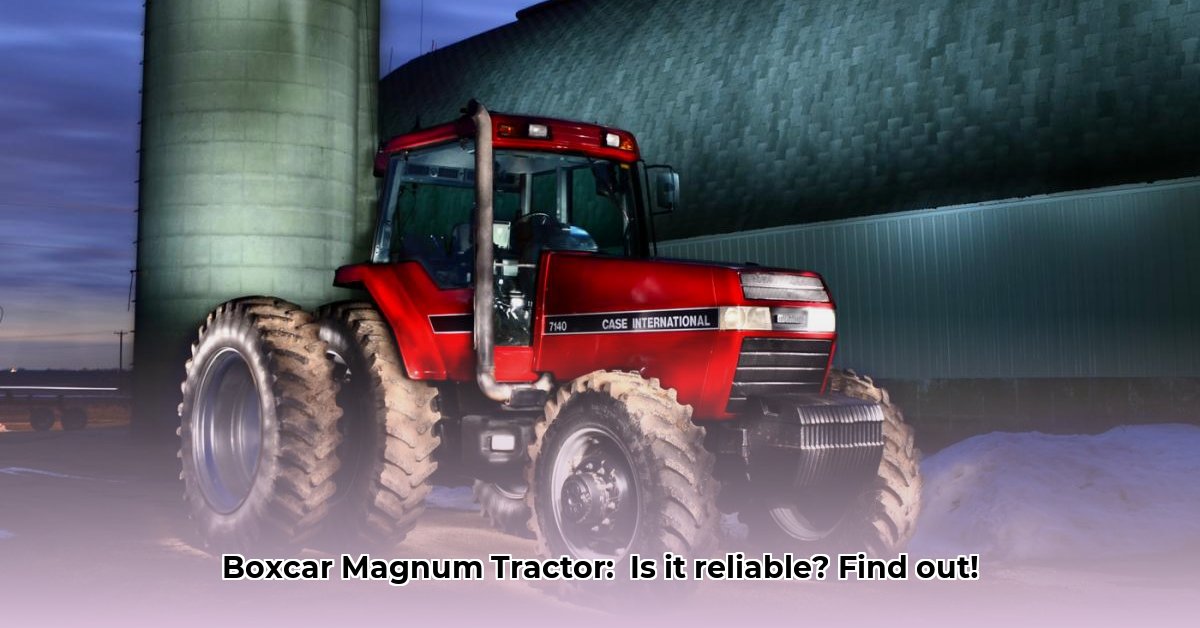
Thinking about purchasing a used Case IH Magnum "Boxcar" tractor? This comprehensive guide provides essential information for prospective and current owners, covering reliability, maintenance, and potential upgrades. We'll analyze the strengths and weaknesses of this powerful machine to help you make an informed decision. To determine the year of your tractor, check out this helpful resource: tractor serial number lookup.
Boxcar Magnum Tractor: Performance and Practical Considerations
Case IH Magnum "Boxcar" tractors, particularly models like the 7120, are renowned for their impressive power and pulling capabilities. Owners often cite their exceptional performance in demanding field conditions. However, this robust power comes with considerations. High engine temperatures under heavy loads necessitate vigilant monitoring of the engine temperature gauge. Regular checks are crucial for preventing potential overheating issues. Many models boast dual PTOs (540/1000 rpm), enhancing versatility, but verifying this feature before purchase is essential.
Is the sheer power worth the trade-off of increased maintenance demands? The answer hinges on your specific needs and farming operations.
Maneuverability and Operational Challenges
While powerful, Boxcar Magnums aren't known for their agility. The turning radius, particularly with wider front tires, often receives criticism. This is a substantial machine, demanding more space to maneuver compared to modern tractors. While the Magnum Front Drive (MFD) option improves maneuverability, it doesn't fully negate the size limitations. Before purchasing, carefully assess your field size and layout to determine if the turning radius will significantly impact your workflow.
Will the size and turning radius compromise efficiency on your farm? This is a critical question to consider.
Transmission System: Reliability and Potential Issues
The transmissions are generally reliable, delivering smooth operation. However, reports of minor issues like hesitation between gears or rough shifting are relatively common. These might indicate worn-out accumulators, requiring attention. The two-speed reverse in some models is another point of discussion; many users prefer the four-speed option, which can be retrofitted, though at additional expense. A thorough test drive is crucial to assess the transmission's responsiveness.
How crucial is smooth shifting to your operation, and what’s your repair budget?
Maintenance: An Investment in Longevity
Regular maintenance is pivotal for maximizing the lifespan of your Boxcar Magnum. Preventative care is an investment in long-term reliability. Plan for fuel injector replacement approximately every 3-4000 hours. Regularly inspect hydraulic hoses for leaks; early detection prevents major problems. Don't overlook the shift accumulators, and be prepared for potential rear main seal replacement. A pre-purchase inspection by a qualified mechanic is highly recommended.
What is your preventative maintenance budget, and how will it impact the tractor’s overall lifespan?
Parts Availability and Sourcing
Finding parts for Boxcar Magnums is typically straightforward. However, some specialized components, especially those for creeper-equipped transmissions, might require more effort and potentially longer lead times. Always factor in potential delays when sourcing less common parts.
How will parts availability impact your operational downtime?
Risk Assessment: Identifying Potential Problems
| Component | Risk Level | Mitigation |
|---|---|---|
| Transmission | Medium | Regular maintenance; proactive accumulator replacement |
| Hydraulic System | Medium | Preventative maintenance; address hose leaks promptly |
| Engine | Low | Scheduled maintenance; timely injector replacement |
| PTO System | Low | Verify functionality before purchase; ensure correct speed settings |
| Turning Radius | High | Carefully assess field suitability; accept limitations upfront |
Pre-Purchase Checklist: Essential Steps
- Meticulous Inspection: Conduct a thorough visual inspection for leaks, focusing on the rear main seal.
- Transmission Test Drive: Extensively test the transmission, noting any unusual behavior.
- PTO Functionality Check: Verify correct PTO engagement, disengagement, and speed settings.
- Hydraulic System Evaluation: Inspect for leaks or inconsistencies within the hydraulic system.
- Turning Radius Test: Evaluate maneuverability in conditions representative of your typical operations.
Conclusion: Weighing the Strengths and Weaknesses
A used Boxcar Magnum tractor can be a valuable asset with proper maintenance and realistic expectations. Its robust power and generally reliable components make it a worthy consideration. However, potential transmission, hydraulic, and maneuverability issues should be factored into your decision-making process. Regular maintenance and a comprehensive pre-purchase inspection are crucial for mitigating risks.
How to Upgrade Case IH Magnum Boxcar Transmission (Optional)
This section explores potential transmission upgrades and alternatives.
Assessing Transmission Health
Before any upgrades, thoroughly assess the current state of your transmission. A faulty Transmission Control Valve (TCV) is a common problem and should be addressed before considering major upgrades.
Transmission Repair vs. Upgrade
Repair costs vary significantly, depending on the issue's complexity. Weigh the costs against possible upgrades and their potential return on investment.
Upgrade Options
While some upgrades are feasible (e.g., PTO modifications), comprehensive transmission overhauls are complex requiring specialized expertise.
Alternative: The 8970 Genesis
The Case IH 8970 Genesis series offers a significant upgrade with improved comfort, performance, and modern features. Consider it as an alternative to extensive repairs or upgrades.
Preventative Maintenance
Prioritize preventative maintenance to avoid costly future repairs.
Pros & Cons of Upgrading
| Feature | Pros | Cons |
|---|---|---|
| Potential Upgrades | Increased power, potentially improved efficiency, enhanced features | High costs, potential for unforeseen complications, may not be cost-effective |
| Repair vs. Upgrade | Addresses immediate issues, often cheaper initially | May not address underlying issues or provide future improvements |
| Genesis Alternative | Superior features, increased performance, higher reliability | Significant investment required |